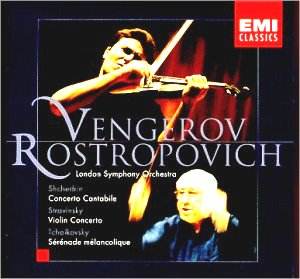SHCHEDRIN: Concerto Cantabile;
STRAVINSKY: Violin Concerto in D;
TCHAIKOVSKY: Serenade melancolique
 Maxim Vengerov
(violin)/London Symphony Orchestra/Mstislav Rostropovich
Maxim Vengerov
(violin)/London Symphony Orchestra/Mstislav Rostropovich
 EMI CDC
(7243 outside of UK; PM 518 in France) 5 56966 2 [60'
51"]
EMI CDC
(7243 outside of UK; PM 518 in France) 5 56966 2 [60'
51"]
Crotchet
Amazon UK
Amazon
USA

Rodion Shchedrin (born 1932 in Moscow) - prolific composer, excellent pianist
and collector of indigenous-folksong - wrote Concerto Cantabile for
Vengerov in 1998. It's a 30-minute piece for violin and string orchestra,
a big 15-minute first movement counterbalanced by two linked movements totalling
a similar length. Intense and soulful, with evolving melodic lines, the music
contrasts emotional and animated sections with reveries of reminiscence.
Often eloquent and deeply-felt, intimacies of thought and memories of childhood
(at the close the soloist is required to imitate a shepherd's pipe - an indelible
memory from Shchedrin's earliest remembrance) are interwoven with more public
outbursts of emotion. An engaging, ever-changing rhythmic profile informs
the second movement, the soloist alternating bowed and pizzicato notes over
cello and double bass ostinati. A cadenza is suggested (from 4'42", track
2) but the music appears to head for catastrophe before the last movement's
cry of pain from massed strings establishes some sort of troubled consolation
that leads to "shepherd's (sic: shepherds'?) tunes floating across the river".
I find more in Concerto Cantabile each time I listen to it. I had
thought it too long but am not so sure now. It's often a very beautiful piece,
quite personal. Is there a sub-text? Shchedrin might well be offering a
commentary on life today (as he sees it - intermingled with nostalgia). But
there's always tomorrow and I think Shchedrin proposes uncertainty at the
work's close. This music grows in stature with repeated listening.
There is a caveat though about Vengerov being so closely balanced. His playing,
of course, can withstand the auditory spotlight (and the LSO strings are
faithfully captured - they are very fine under Rostropovich's sympathetic
leadership) but I grew somewhat weary with the explicit presentation that
allows Vengerov to dominate the full string band unnaturally. I don't think
Shchedrin's music is harmed - though I would like to hear a more intimate
rendering, one better balanced - but the recording does harm the Stravinsky.
Put simply, Vengerov is too close. Although some orchestral instruments are
consciously highlighted in the sound-blend, others are not. The result loses
sight of Stravinsky's carefully constructed musical line. Dialogue between
the violin and orchestral instruments (and between orchestral instruments
themselves) is not as clear as it should be. There are times when Vengerov
should not be as audible as he is, the ear is distracted to him when it should
be concentrating on more important things in the orchestra. This is a piece
of music we're talking about, not an empty exercise in virtuosic display.
I grew very tired of only being able to hear Vengerov and those instruments
selected by the recording team. In any case, Vengerov's often over-wrought
account of the solo part is equally tiresome as he squeezes as much emotional
juice out of every phrase as he can. In short, I find Vengerov's inflation
of the solo part (exacerbated by the forward balance) foreign to Stravinsky's
neo-classical creation. Of course, the music has a heart, and this is more
subtly and truthfully bespoken by Viktoria Mullova (Philips, with Bartok's
Second Concerto, Salonen conducting). Vengerov's most devoted admirers will
probably disagree with my assessment (incidentally, I do think him an outstanding
player) but Stravinsky's music must come first.
The first couple of minutes of the Tchaikovsky offer balm to the ear: hushed,
confidential, smoky-toned playing absolutely at one with the music, an
identification shared by Rostropovich, but in the more animated middle section
the balance reduces Vengerov to shouting the music. Does he insist on this
forward projection? If so someone should have a word with him - a quiet one.
How to assess this CD? I can certainly recommend the Shchedrin. It's the
only recording and there might not be another for some time. It's a fine
piece too, and if you have my initially negative reaction (mine at the UK
premiere with these artists just before the recording was made) then this
is an invaluable release to get to know the music better. I'm disappointed
with the Stravinsky, while the Tchaikovsky, recording aside, is wonderful.
Vengerov's most devoted followers will buy this CD anyway (please get Mullova's
Stravinsky as well!). However, I would caution against the notion that if
it's Vengerov it must be great and better than anyone else (which appears
to be the consensus view at present). With Mullova, Shaham and Repin around
(I haven't forgotten Mutter but she, like Vengerov, tends to draw attention
away from the music) such idolatry is dangerous. And no following markings
- this CD demands words not stars!
Reviewer
Colin Anderson
